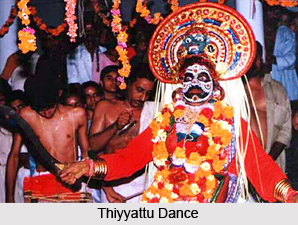 Thiyyattu dance is associated with the worship of Devi in the form of Bhadrakali. The rituals are performed in "Kavu". This art is popular in central Kerala. Several rituals associated with worship of Bhadrakali are also performed in Thiyyattu. The two types of Thiyaattu dance namely are Bhadrakali Thiyyattu and Ayyappan Thiyyattu.
Thiyyattu dance is associated with the worship of Devi in the form of Bhadrakali. The rituals are performed in "Kavu". This art is popular in central Kerala. Several rituals associated with worship of Bhadrakali are also performed in Thiyyattu. The two types of Thiyaattu dance namely are Bhadrakali Thiyyattu and Ayyappan Thiyyattu.
Bhadrakali Thiyyattu
It is performed in Bhadrakali temples of Ernakulam, Kottayam, Alapuzha and Pathanamthitta districts of Kerala. The dance form has been reformed and revived by Shree Bhadra Kalasamajam. This ritualistic dance follows strict traditional rules. A number of rituals are associated with Bhadrakali Thiyyattu.
Kalamezhuthu and Pattu
Kalamezhuthu is powder drawing which is performed by drawing large figures using coloured powders. The powder is spread on the floor in a pattern with bare hands, letting it in a thin stream between the thumb and the index finger. They are drawn on the floor of the temple hall and decorated elegantly with tender leaves and colourful flowers. Kalamezhuthu starts at noon on the day when Theeyattu is to be performed during the night. Songs are sung in praise of Lord Ganesha, Goddess Saraswati, Guru and some other Gods. Drums and gongs are used while singing.
Sandhyakkottu
This is the performance of various percussion instruments at sunset. This ritual announces to those staying around that a performance is due that night.
Ethirelpu
Ethirelpu or procession is a ritual that takes place in every temple as part of the festivities. The idol will be taken out in a procession around the temple.
Gurudi
Gurudi is an obligatory as well as a Tantric ritual that is performed before Thiyyattu in order to appease the demonic spirits who assisted the goddess in her tribulation. This resembles a sacrifice.
Performance of Bhadrakali Thiyattu
The performance is done by a single actor called Theeyattunni who enters the venue, lighted by a huge oil lamp, with the make up of Goddess Bhadrakali. There is no head gear. He invokes the benevolence of various gods for the success of the performance and welfare of the audience. In front of the audience he wears the huge headgear. Thiyyattu is concluded by the enacting of the killing of Darikasura. This act represents the destruction of evil.
Ayyappan Thiyyaattu
Ayyappan Thiyyattu is mainly performed by the Thiyyadi Nambiar community in the temples in three districts namely Malappuram, Palakkad and Thrissur. The dance is characterized by four phases.
Kalamezhuthu
In this phase the picture of Ayyappa, Kalam, is sketched by using natural pigments on the sanctified floor.
Kottum Pattum
It is the second phase which is accompanied by performing invocatory songs of Ayyappa and narrating the story of his birth in a stylized manner.
Koothu
It is the third phase which is characterized by gesture laden dance in which a story is enacted.
Velichchappaadu
The dance of this phase varies from slow to frenzied forms performed by the dancer who gradually erases the Kalam.
Bhadrakali Thiyaattu is generally performed by a Brahmin community of Kerala known as Thiyaattunnis. The other style, Ayyappan Thiyaattu, is performed by a sub-caste of Ambalavasi community, known as Nambiars. Throughout the performance there are several chants, dances of Tandava style, gestures and gesticulations.